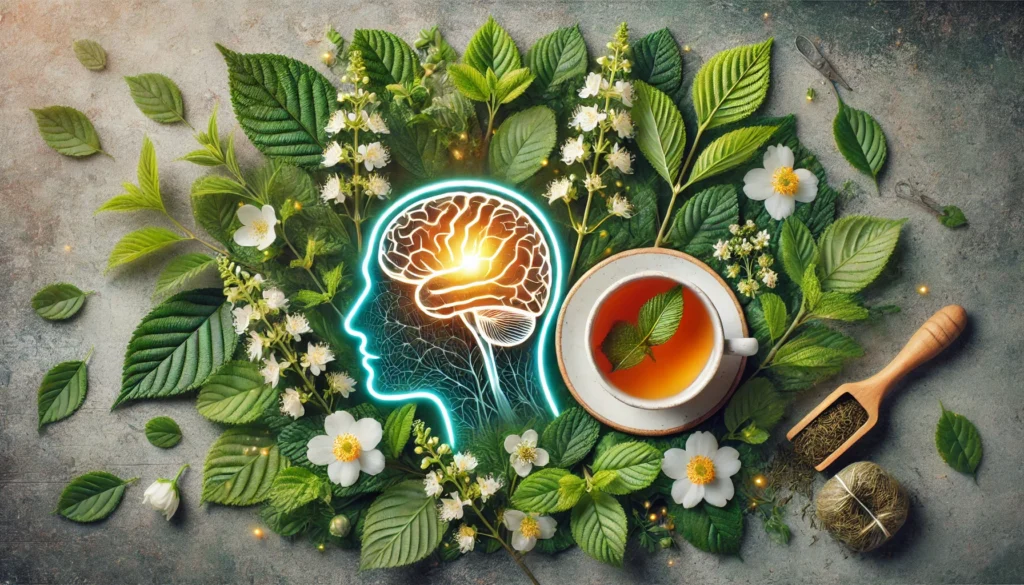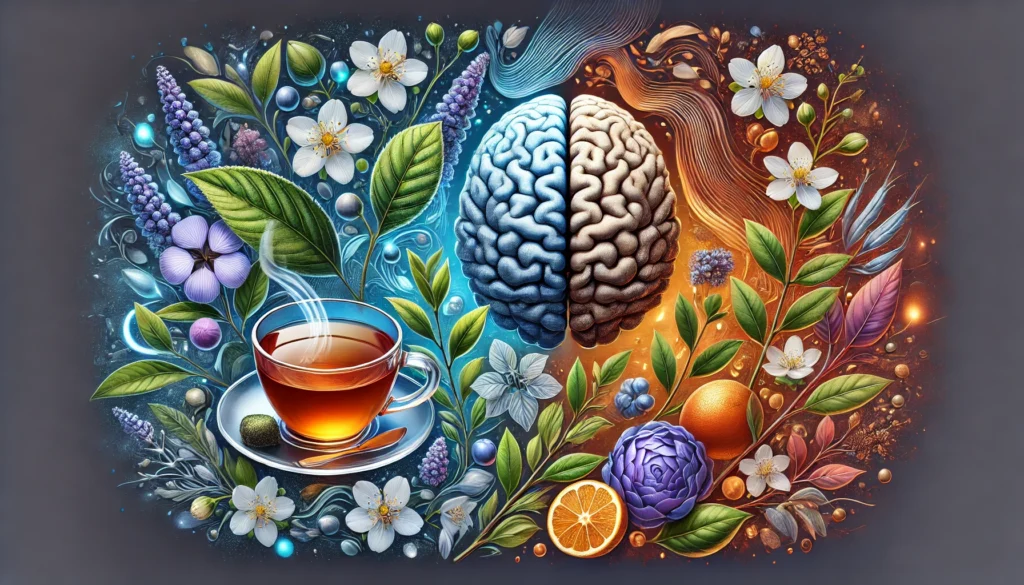New Jersey Tea (Ceanothus americanus) is a plant native to North America, traditionally used for its medicinal properties. Historically employed by Native American tribes for respiratory issues, wounds, and infections, it’s now drawing attention to potential cognitive and neuroprotective effects. This article explores the chemistry, physiological mechanisms, potential nootropic benefits, dosage recommendations, side effects, interactions, and precautions related to New Jersey Tea as a supplement.
You May Also Like:
Theaflavin: Benefits, Dosage, Side Effects, Drug Interactions, and Other Important Information
Source and Active Compounds of New Jersey Tea
New Jersey Tea is a shrub that belongs to the Rhamnaceae family, commonly found in eastern North America. Its leaves contain several bioactive compounds, including flavonoids, tannins, and alkaloids, which contribute to its health-promoting properties. Among these, flavonoids such as quercetin and catechins are notable for their antioxidant and anti-inflammatory effects. Quercetin, in particular, has been studied for its neuroprotective properties and capacity to mitigate oxidative stress—a critical factor in cognitive decline.
Another active compound in New Jersey Tea, known as ceanothine, belongs to a class of alkaloids that influence blood flow and may improve oxygen delivery to tissues, including the brain. Additionally, tannins in New Jersey Tea have antimicrobial properties and contribute to its astringent effects, often used in traditional medicine to reduce inflammation and alleviate sore throats.
Support Healthy Sleep Patterns and Nighttime Recovery with Sleep Supplements—Order Today on Amazon!

Chemistry of New Jersey Tea
The bioactive compounds in New Jersey Tea function mainly as antioxidants. Quercetin and catechins combat free radicals, reducing oxidative stress and promoting cellular health. Quercetin has a structure similar to other bioflavonoids that allows it to cross the blood-brain barrier, making it a candidate for neuroprotection and brain health support. This compound also inhibits the enzyme monoamine oxidase (MAO), which plays a role in mood regulation. By modulating MAO, quercetin may enhance neurotransmitter balance, potentially boosting mood and cognitive clarity.
Tannins in New Jersey Tea possess polyphenolic structures, allowing them to bind with proteins and other organic compounds, which can be beneficial for cellular protection and modulation of signaling pathways associated with inflammation. Although tannins have limited absorption in the body, they still exert a local anti-inflammatory effect, particularly in the gastrointestinal tract, and may support gut health.
Physiological Mechanisms of New Jersey Tea in the Body and Brain
The primary mechanism of New Jersey Tea’s cognitive effects appears to involve its antioxidant and anti-inflammatory activities, which can protect neurons from oxidative stress and inflammation—two factors linked to cognitive impairment and neurodegenerative diseases. The flavonoid quercetin has been shown to increase levels of brain-derived neurotrophic factor (BDNF), a protein crucial for neuronal growth, differentiation, and repair. Higher BDNF levels are associated with improved memory and learning capabilities, suggesting a potential role for New Jersey Tea in cognitive health.
Furthermore, ceanothine and other alkaloids in New Jersey Tea may improve blood circulation, potentially benefiting cognitive function by increasing the supply of oxygen and nutrients to the brain. Improved circulation is also associated with reduced mental fatigue and sharper mental clarity. Catechins in New Jersey Tea provide an additional antioxidant effect, which may support cellular health across various tissues, including the brain, by neutralizing free radicals that can damage neurons.
Recharge Mental Energy and Cognitive Function with Top-Rated Nootropics—Buy Today on Amazon!

Potential Nootropic Benefits of New Jersey Tea
- Enhanced Cognitive Clarity and Focus: The antioxidant properties of quercetin and catechins help reduce oxidative stress in the brain, which can improve mental clarity and focus. By preserving neuronal health, New Jersey Tea may help combat cognitive fatigue and improve overall cognitive function, especially under stress.
- Mood Support: Quercetin’s ability to inhibit MAO may enhance the levels of neurotransmitters like serotonin and dopamine, contributing to a more balanced mood. This could make New Jersey Tea beneficial for individuals experiencing mood imbalances or cognitive disturbances related to stress.
- Neuroprotection: The compounds in New Jersey Tea, particularly quercetin, support neuroprotection by elevating BDNF levels. This action may slow age-related cognitive decline and offer protection against neurodegenerative diseases, such as Alzheimer’s.
- Enhanced Blood Flow to the Brain: Alkaloids like ceanothine improve peripheral blood circulation, which could translate to better oxygen and nutrient delivery to the brain, enhancing mental endurance and cognitive sharpness during prolonged mental tasks.
- Antioxidant Defense: By counteracting oxidative damage through its rich flavonoid content, New Jersey Tea may protect against cellular damage that can lead to premature aging of brain cells, supporting long-term brain health and reducing the risk of cognitive impairments.
- Immune System Support: The tannins in New Jersey Tea have natural antibacterial and antiviral properties that may support immune function. By bolstering the body’s natural defenses, New Jersey Tea can aid in reducing inflammation that affects both physical and mental well-being, contributing to a more resilient immune response under stress.
- Gut Health and Cognitive Connection: Tannins and other bioactive compounds in New Jersey Tea support gut health, which is increasingly linked to brain health and mood regulation. By promoting a healthy gut environment, New Jersey Tea may positively impact the gut-brain axis, potentially improving mental clarity and emotional balance over time.

Dosage and Supplementation Guidelines
Currently, there is limited research on standardized dosing for New Jersey Tea, especially for nootropic purposes. However, traditional usage provides some context:
- General Dosage: Doses ranging from 500 mg to 2,000 mg of dried New Jersey Tea leaf have been used for general health benefits, though this varies by individual needs and tolerance. If consumed as a tea, 1–2 grams of dried leaves steeped in hot water for 10–15 minutes is a common recommendation.
- Nootropic Dosage: For cognitive benefits, doses between 500 mg and 1,000 mg per day may be effective, though further research is needed. This dosage provides adequate antioxidant support and may contribute to enhanced mental clarity without overwhelming the body’s ability to process flavonoids and tannins.
- Supplement Forms: New Jersey Tea is available as dried leaves, powders, and capsules. Tea forms are often used for respiratory and digestive health, while capsules offer convenience and consistent dosing for cognitive and systemic benefits.
It’s recommended to start with a lower dose and gradually increase to gauge tolerance and effect. Consulting with a healthcare provider is essential, especially for individuals with specific health conditions.
Side Effects and Safety
New Jersey Tea is generally well-tolerated, but high doses or prolonged use may lead to side effects due to its tannin content, which can cause gastrointestinal upset in some individuals. Possible side effects include:
- Gastrointestinal Discomfort: Tannins may cause mild digestive issues, including nausea or constipation, particularly when consumed in large amounts.
- Allergic Reactions: Some individuals may experience mild allergic reactions, such as skin rashes or itching, though these cases are rare.
- Liver Health: Long-term use of high doses could potentially affect liver health due to the cumulative effect of tannins. Monitoring intake and consulting a healthcare provider are advised if prolonged use is considered.
Given these side effects, it’s best to avoid excessive or long-term use of New Jersey Tea, especially without medical supervision.

Interactions with Other Supplements and Medications
New Jersey Tea has a range of potential interactions with other substances. Awareness of these interactions is crucial for safe supplementation:
- Anticoagulants and Antiplatelet Drugs: Due to the blood-circulating effects of ceanothine, New Jersey Tea may enhance the effects of blood thinners, increasing the risk of bleeding. Individuals on anticoagulants, such as warfarin, should exercise caution and consult a healthcare provider before using this supplement.
- Antidepressants: Quercetin’s MAO-inhibiting effects could interact with antidepressants, especially MAO inhibitors, and other mood-regulating medications. Such combinations may lead to heightened effects or side effects, so professional guidance is necessary.
- Iron Supplements: Tannins in New Jersey Tea can bind to iron, potentially reducing iron absorption. Individuals with iron-deficiency anemia or those taking iron supplements should space out the intake of New Jersey Tea and iron supplements by several hours to prevent interference with iron absorption.
- Other Nootropics: When combined with other nootropics or stimulants, such as caffeine, New Jersey Tea may enhance focus but could also increase the risk of nervousness or overstimulation. Starting with lower doses when combining nootropics is recommended.
Risks for Individuals with Certain Health Conditions
New Jersey Tea may not be suitable for everyone, particularly individuals with certain health conditions:
- Liver Disorders: The presence of tannins may impose an additional burden on liver function, especially in individuals with pre-existing liver conditions. Those with liver diseases should consult a healthcare provider before considering New Jersey Tea.
- Kidney Disorders: Individuals with kidney issues should be cautious, as the kidneys filter many of the plant’s compounds. High doses may contribute to kidney strain or lead to adverse effects.
- Pregnancy and Breastfeeding: There is insufficient research on the safety of New Jersey Tea during pregnancy and breastfeeding. Due to potential risks, it’s recommended that pregnant or breastfeeding individuals avoid this supplement.
Is New Jersey Tea a Good Nootropic Choice?
New Jersey Tea presents an intriguing option as a nootropic, primarily due to its antioxidant and anti-inflammatory properties and potential to improve blood flow. The flavonoid content, particularly quercetin, supports cognitive clarity, neuroprotection, and mood stability, making it a promising supplement for those interested in enhancing brain health. While more research is needed to confirm its nootropic benefits fully, New Jersey Tea’s traditional uses and early scientific findings highlight its potential.
However, due to possible side effects and interactions with other medications, cautious use is advised, particularly for individuals with underlying health conditions. For those looking to explore New Jersey Tea as a cognitive aid, starting with a low dose and seeking professional guidance is recommended. New Jersey Tea offers a natural approach to cognitive support, blending traditional wisdom with emerging research. By respecting dosage guidelines and being mindful of interactions, this plant could serve as a beneficial addition to a balanced nootropic regimen.

References:
- New Jersey Tea – Uses, Side Effects, and More. Retrieved from: https://www.webmd.com/vitamins/ai/ingredientmono-579/new-jersey-tea
- Red Root: Uses, Benefits, Side Effects, and Dosage. Retrieved from: https://www.healthline.com/nutrition/red-root
- Antimicrobial compounds from Ceanothus americanus against oral pathogens. Retrieved from: https://pubmed.ncbi.nlm.nih.gov/9276981/
Important Note: The information contained in this article is for general informational purposes only, and should not be construed as health or medical advice, nor is it intended to diagnose, prevent, treat, or cure any disease or health condition. Before embarking on any diet, fitness regimen, or program of nutritional supplementation, it is advisable to consult your healthcare professional in order to determine its safety and probable efficacy in terms of your individual state of health.
Regarding Nutritional Supplements Or Other Non-Prescription Health Products: If any nutritional supplements or other non-prescription health products are mentioned in the foregoing article, any claims or statements made about them have not been evaluated by the U.S. Food and Drug Administration, and such nutritional supplements or other health products are not intended to diagnose, treat, cure, or prevent any disease.


